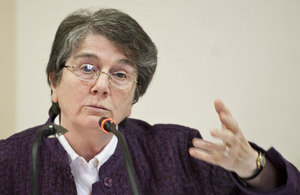Holy See: Fighting modern slavery
Our Ambassador Sally Axworthy reflects on the work of Sister Imelda Poole in celebration of International Women's Day.

Sr Imelda PooleIBVM. Photo: © Mazur/catholicnews.org.uk
Sister Imelda Poole heads a network of European religious fighting trafficking and exploitation (RENATE). As such, she is a key ally for the UK’s Prime Minister’s goal of eradicating modern slavery.
When she was 13, Imelda spent a week praying that she would never become a nun. But a few years later, she met the sisters from the Institute of the Blessed Virgin Mary (IBVM) and was impressed by their wholesome lives. She, as she puts it, fell in love with Christ, and joined the IBVM.
The IBVM is one of the two orders whose founder is Mary Ward (see Monday’s profile of Jane Livesey). Like the Congregation of Jesus, the IBVM follow the spirituality of Saint Ignatius Loyola, including his Spiritual Exercises which help the individual discern his or her calling in the world.
Imelda, having studied English and History at Manchester University followed by a PGCE in Theology and English, plunged into work with disadvantaged people in Glasgow, London and Manchester. From there she went to Kenya and experienced life with the Kipsigi tribe in Keberneti, a desperately poor people. There she learned the value of just being with them. This lesson prepared her for her following mission where she worked with marginalised people - on a council estate near Middlesborough. There it was normal for three generations of families to be unemployed. Imelda spent her first two years visiting every family on the estate and listening to their stories – of despair, drugs and domestic abuse. Then, with funding from the EU and in collaboration with a strong team including local people, services including a medical centre, a community centre, a hairdressers, and a space for ecumenical worship, were set up. She described to me her sense of privilege at being in this place with people who taught her so much about living in poverty.
16 years later, the IBVM’S General Congregation (governing assembly) decided that each province of the order should open a community in another country. The Archbishop of Tirana asked the English Province to focus on anti-trafficking in Albania. They founded an NGO called Mary Ward Loreto in Albania and launched many projects. One of these is called Mary Ward Loreto Women in which six Mary Ward centres have been established to work on prevention, advocacy, awareness, and rescuing of women. The centres have worked with 3,000 women, and set up 16 economic empowerment businesses e.g. making school uniforms for Mary Ward schools in Spain. They also have a men’s project aimed at changing patriarchal culture and promoting gender equality. The work with men is to address depression, anger and fear, drug and alcohol addictions related to unemployment and their changing role in society. Mary Ward Loreto is promoting ethical and democratic best practice in Albanian schools and in all of the projects.
The anti-trafficking work has led to Sister Imelda becoming the President of RENATE, the European anti-trafficking network, and work with Talitha Kum (‘Little girl, arise’ in Aramaic), the female religious orders’ worldwide anti-trafficking network. RENATE has a five-year strategic plan which includes combating human trafficking in all forms. Presently RENATE is focusing on Child kidnapping and trafficking. They are beginning, as they always do, with research - with a Cambridge University academic. In February, RENATE spear-headed the anti-child trafficking campaign in Europe for the day of Saint Josephine Bakhita, the patron saint of slaves.
The sisters are putting their resources where they see the most pressing modern needs. They have the people and buildings to enable them to support trafficking victims. They are an important partner for the UK in this global fight.